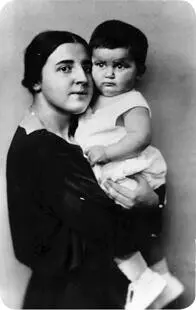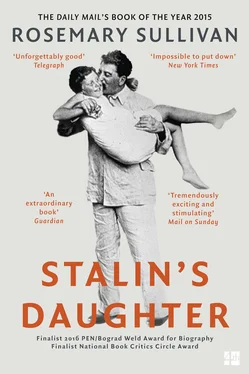Svetlana called her childhood normal, full of loving relatives, friends, holidays, pleasure. She even claimed that it was modest, and for the child of a head of state, perhaps it was, though the millions of Russians who were starving and displaced would have been outraged.
In her memoir she wrote: “If only out of respect for their memory, from love and profound gratitude for what they were to me in that place of sunshine I call my childhood, I ought to tell you about them.” 39
It was a willful declaration, for the memories were full of paradoxes and frustrations. “I keep trying to bring back what is gone, the sunny, bygone years of my childhood,” she would write over thirty years later, as if acknowledging the impossibility of this. 40
From the child’s point of view, the world may have been undiluted sun, though with a child’s intuition, she must already have sensed the cracks in her paradise. From an adult perspective, it was a labyrinthine tangle of pain and anxiety.
Chapter 2
A Motherless Child

Nadya with a young Svetlana, c. 1926.
(Svetlana Alliluyeva private collection; courtesy of Chrese Evans)
During the afternoon of November 7, 1932, Svetlana stood with her mother at the front of the crowd watching the soldiers march past the Hall of Columns to honor the fifteenth anniversary of the Great Revolution. This was the first time she had been allowed to attend the annual celebrations. It was an extraordinary festival, with stilt walkers, fire-eaters, and circus performers moving into and out of the throng of thousands of people. She looked up at her father on the platform where his giant image hung behind the Party magnates lined up dutifully on either side of the vozhd . She was only six and a half, but she understood that her father was the most important man in the world.
Earlier that day, her mother had called her into her room. “I saw my mother so rarely that I remember our last meeting very well.” Svetlana sat on her favorite takhta and listened as her mother delivered a long lesson on manners and deportment. “Never drink wine!” she said. 1Nadya and Stalin always quarreled when he dipped his finger into his wine and put it into his children’s mouths. She protested that he would turn her children into alcoholics. Her final words to Svetlana were in character. Nadya dismissed as self-indulgence the emotional effusiveness that she associated with her mother, Olga; and her sister, Anna. Crying, confessions, complaining, and even frankness were not in her repertoire. The most important thing was to do one’s duty and to hide one’s secrets in the small square over one’s heart.
As her nanny put her to bed, Svetlana recounted how Uncle Voroshilov led the whole parade riding on a white horse.
On the morning of November 9, Alexandra Andreevna got the children up early and sent them out to play in the dark, rainy dawn. When they were bundled into a car hours later, the staff all seemed to be crying. They were driven to the new dacha at Sokolovka. Stalin had begun to indulge his penchant for building dachas, and that fall the family was using the Sokolovka dacha instead of Zubalovo. The house was gloomy, with a dark interior that seldom got any light. The children knew something was terribly wrong and kept asking where their mother was. Eventually Voroshilov arrived to take them back to Moscow. He was in tears. Their father seemed to have disappeared.
So many apocryphal stories have gathered around what had happened the previous night that it is impossible to sort fact from fiction, gossip from truth, but a rough outline of the night can be reconstructed.
In the late afternoon of November 8, Nadya was in the apartment in the Poteshny Palace preparing for the inevitably boisterous party to celebrate the Revolution. Her brother Pavel, currently stationed in Berlin as the military representative with the Soviet trade mission, was visiting and had brought her gifts, one of which was a lovely black dress. The Kremlin wives always complained that when they met Nadya at the fashionable Commissariat of Internal Affairs dressmaker on Kuznetsky Bridge, reserved for the Party elite, she selected the most drab and uninteresting clothes. They were amused that she was still following the outdated Bolshevik ethic of modesty. 2That night, in her elegant black dress, she was beautiful; she had even placed a red rose in her black hair.
Accompanied by her sister, Anna, Nadya crossed the snowy lane to the Horse Guards building and entered the apartment of Comrade Voroshilov, the defense commissar, who was hosting the anniversary celebration for the Party magnates and their wives. Stalin sauntered down the lane from his office at the Yellow Palace in the company of Comrade Molotov and his chief of economics, Comrade Valerian Kuibyshev. They had only one or two guards with them, though the Politburo had banned the vozhd from “walking around town on foot.” 3The Politburio had concluded that Stalin was no longer safe, so hated were the policies of terror he had already adopted against so-called industrial saboteurs, bourgeois experts, and political terrorists conspiring with foreign powers. Assassination seemed a real possibility.
For everyone this was an occasion to unwind. The food arrived from the Kremlin kitchen—an ample spread of hors d’oeuvres, fish, and meat, with vodka and Georgian wine—served by the housekeeper. The men, many still sporting the tunics and boots that were a throwback to their revolutionary past, and the women in their designer dresses, sat at the banquet table. Stalin sat in his usual spot in the middle of the table, across from Nadya. This was a hard-drinking, exuberant lot, ready to down toast after toast to the old revolutionary triumphs and the new industrial achievements.
In the anecdotal reports in the multiple memoirs left behind by those present at the party that night, stories coalesce around the following details. Stalin was drunk and was flirting boorishly with Galina, a film actress and the wife of the Red Army commander Alexander Yegorov, by lobbing bread balls at her. Nadya was either disgusted or simply tired of all this. There had been gossip about Stalin’s current dalliance, with a Kremlin hairdresser. Stalin liked to confine his philandering to those from whom discretion could be ensured, and a hairdresser working at the Kremlin would have belonged to the secret police. Nadya had seen it all before and knew these affairs never lasted, though neither she nor anyone else seemed to know how far they went. Years later Stalin’s bodyguard Vlasik made the suggestive comment to Svetlana that her father “was a man after all.” 4That night, Nadya was seen dancing coquettishly with her Georgian godfather, Abel Enukidze, then administrator of the Kremlin complex, a usual stratagem for an angry woman to demonstrate her studied indifference to her husband’s flirtations.
Many accounts claim that it was a political toast that inflamed Nadya. Stalin toasted “the destruction of enemies of the state” and noticed that Nadya did not raise her glass. He shouted across the table, “Hey you, why aren’t you drinking? Have a drink!” 5
She replied venomously, “My name is not hey ,” before storming out of the room. The revelers could hear her shouting over her shoulder, “Shut up! Shut up!” as she exited. The room fell silent in shock. Not even a wife would dare turn her back on Stalin. Stalin only muttered contemptuously, “What a fool,” and kept on drinking.
Nadya’s close friend Polina Molotov rushed out after her. According to Polina, she and Nadya circled the Kremlin a number of times as Polina reminded her of how much pressure Stalin was under. He was drunk, which was rare: he was just unwinding. Polina said Nadya was “perfectly calm” when they said good night in the early hours of the morning. 6
Читать дальше












![John Bruce - The Lettsomian Lectures on Diseases and Disorders of the Heart and Arteries in Middle and Advanced Life [1900-1901]](/books/749387/john-bruce-the-lettsomian-lectures-on-diseases-and-disorders-of-the-heart-and-arteries-in-middle-and-advanced-life-1900-1901-thumb.webp)
